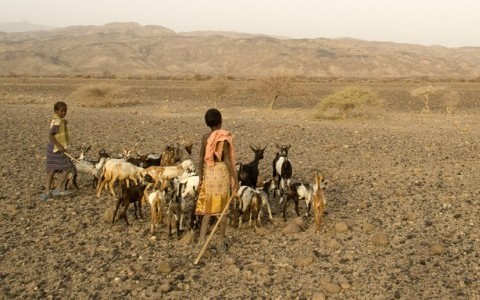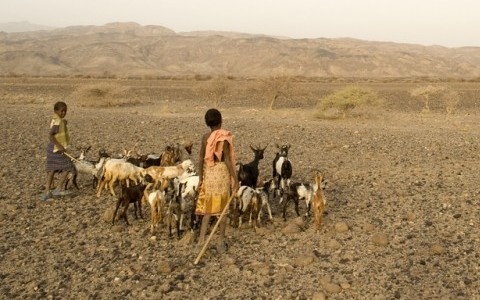At the opening of the international climate change talks in Bonn, Germany, today, representatives from governments around the world shared their opinions on a newly released draft of a global climate treaty that will be debated and (perhaps) finalized when they meet again in Copenhagen in December.
 Children herd goats in drought-ridden Ethiopia, on land that was once rich pasture.Photo: Nick Danziger/OxfamWhile representatives of the industrialized world somewhat sheepishly offered up their countries’ meager progress in slowing the pace of their rampant growth in emissions, representatives from the developing world did their best to sound the alarm.
Children herd goats in drought-ridden Ethiopia, on land that was once rich pasture.Photo: Nick Danziger/OxfamWhile representatives of the industrialized world somewhat sheepishly offered up their countries’ meager progress in slowing the pace of their rampant growth in emissions, representatives from the developing world did their best to sound the alarm.
“We need to act urgently, as the most vulnerable among us are suffering daily,” said the representative of the G77 and China. “Climate change is the defining challenge of our times.”
“Climate change is one of humanity’s greatest injustices; addressing it aggressively will determine our survival,” said the representative from the Alliance of Small Island States. “We are concerned about efforts to downplay the science for political expediency.”
“We should not forget that we are all in this together,” said the representative of Togo, “and a sinking boat is a catastrophe for all of us.”
Over the next two weeks, these delegates, who make up the climate convention’s “Ad Hoc Working Group on Long-term Cooperative Action,” will debate, expand, and refine the draft text of an agreement. They will endeavor to agree on who must cut emissions, by how much, and on what timescale. And they will discuss how the industrialized countries will help the developing world adapt to the climatic changes that are already here and are destined to get much worse before they get better.
While the official country delegations hammer out these details, those of us with NGO observer status sit in the back of the room listening to simultaneous translation through headsets, furiously typing notes, and exchanging knowing glances when Australia says something disastrous but predictable.
Throughout these two weeks, we will come together in various strategic working groups and alliances, determining strategies for injecting, protecting, or jettisoning specific language in the text that relates to our various missions and goals. The hallways outside meeting rooms resonate with animated conversations. Reports and fact sheets fly off tables in the exhibit area. A full schedule of fascinating side events clamors for our attention.
And we’ll use the opportunity of this gathering to network and communicate new or under-reported issues. My organization, Population Action International, is here because we believe population issues are critical in the climate change equation. And we believe that there are some great population-related policies — like expanding access to reproductive health and family-planning programs to the millions of women around the world who want it but don’t have it — that can and should be part of a comprehensive solution to climate change. Not many people are talking about this. We’re working to change that — in Bonn, Copenhagen, and beyond.
Read a second dispatch from Kathleen Mogelgaard of Population Action International.




